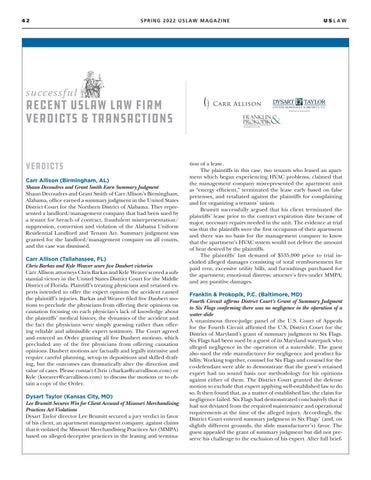42
SPRING 2022 USLAW MAGAZINE
USLAW
s u cc essful
RECENT USLAW LAW FIRM VERDICTS & transactions verdicts Carr Allison (Birmingham, AL) Shaun Decoudres and Grant Smith Earn Summary Judgment Shaun Decoudres and Grant Smith of Carr Allison’s Birmingham, Alabama, office earned a summary judgment in the United States District Court for the Northern District of Alabama. They represented a landlord/management company that had been sued by a tenant for breach of contract, fraudulent misrepresentation/ suppression, conversion and violation of the Alabama Uniform Residential Landlord and Tenant Act. Summary judgment was granted for the landlord/management company on all counts, and the case was dismissed. Carr Allison (Tallahassee, FL) Chris Barkas and Kyle Weaver score five Daubert victories Carr Allison attorneys Chris Barkas and Kyle Weaver scored a substantial victory in the United States District Court for the Middle District of Florida. Plaintiff’s treating physicians and retained experts intended to offer the expert opinion the accident caused the plaintiff’s injuries. Barkas and Weaver filed five Daubert motions to preclude the physicians from offering their opinions on causation focusing on each physician’s lack of knowledge about the plaintiffs’ medical history, the dynamics of the accident and the fact the physicians were simply guessing rather than offering reliable and admissible expert testimony. The Court agreed and entered an Order granting all five Daubert motions, which precluded any of the five physicians from offering causation opinions. Daubert motions are factually and legally intensive and require careful planning, set-up in depositions and skilled drafting, but the outcomes can dramatically alter the direction and value of cases. Please contact Chris (cbarkas@carrallison.com) or Kyle (kweaver@carrallison.com) to discuss the motions or to obtain a copy of the Order. Dysart Taylor (Kansas City, MO) Lee Brumitt Secures Win for Client Accused of Missouri Merchandising Practices Act Violations Dysart Taylor director Lee Brumitt secured a jury verdict in favor of his client, an apartment management company, against claims that it violated the Missouri Merchandising Practices Act (MMPA) based on alleged deceptive practices in the leasing and termina-
tion of a lease. The plaintiffs in this case, two tenants who leased an apartment which began experiencing HVAC problems, claimed that the management company misrepresented the apartment unit as “energy efficient,” terminated the lease early based on false pretenses, and retaliated against the plaintiffs for complaining and for organizing a tenants’ union. Brumitt successfully argued that his client terminated the plaintiffs’ lease prior to the contract expiration date because of major, necessary repairs needed in the unit. The evidence at trial was that the plaintiffs were the first occupants of their apartment and there was no basis for the management company to know that the apartment’s HVAC system would not deliver the amount of heat desired by the plaintiffs. The plaintiffs’ last demand of $535,000 prior to trial included alleged damages consisting of total reimbursement for paid rent, excessive utility bills, and furnishings purchased for the apartment; emotional distress; attorney’s fees under MMPA; and any punitive damages. Franklin & Prokopik, P.C. (Baltimore, MD) Fourth Circuit affirms District Court’s Grant of Summary Judgment to Six Flags confirming there was no negligence in the operation of a water slide A unanimous three-judge panel of the U.S. Court of Appeals for the Fourth Circuit affirmed the U.S. District Court for the District of Maryland’s grant of summary judgment to Six Flags. Six Flags had been sued by a guest of its Maryland waterpark who alleged negligence in the operation of a waterslide. The guest also sued the ride manufacturer for negligence and product liability. Working together, counsel for Six Flags and counsel for the co-defendant were able to demonstrate that the guest’s retained expert had no sound basis nor methodology for his opinions against either of them. The District Court granted the defense motion to exclude that expert applying well-established law to do so. It then found that, as a matter of established law, the claim for negligence failed. Six Flags had demonstrated conclusively that it had not deviated from the required maintenance and operational requirements at the time of the alleged injury. Accordingly, the District Court entered summary judgment in Six Flags’ (and, on slightly different grounds, the slide manufacturer’s) favor. The guest appealed the grant of summary judgment but did not preserve his challenge to the exclusion of his expert. After full brief-
